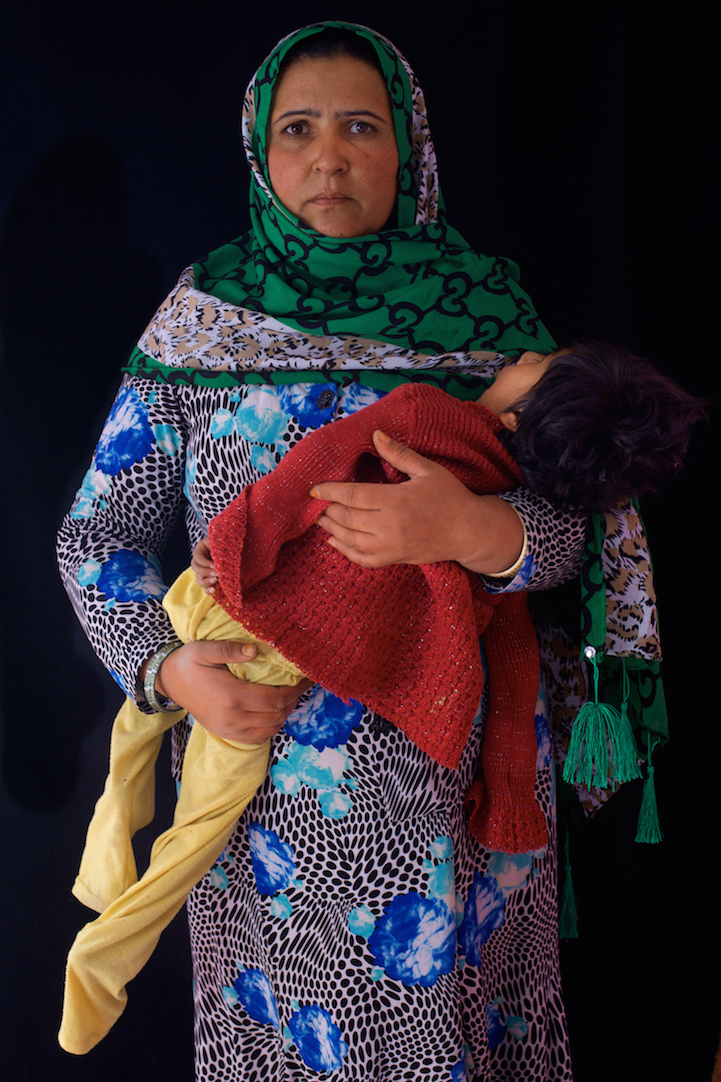Since the collapse of the Taliban regime in late 2001, the lives of millions of people in Afghanistan have changed. Photojournalist Lalage Snow explores how that pivotal moment in history has affected the daily experiences of Afghan women, who are often misrepresented and misunderstood by the very people in the West who are working to improve women's rights. Snow, who is known for her poignant coverage of war and its effects in series like We Are Not The Dead, seeks to dismantle the assumptions assigned collectively to women in Afghanistan through her new project, titled Unveiled, by giving individual voices to those who are often ignored or forgotten in international discourse about the future of the war-torn country.
“13 years after the fall of the Taliban regime, there have been tangible gains for Afghan women,” the project description reads. “The international community is quick to say that almost 4 million girls are in school now and that the rights of women have been dramatically improved. However, most women in Afghanistan are still vulnerable. Unveiled lets 30 women explain their situation in their own words while standing in front of a camera.”
Snow's portraits of the women, paired with quotes from each subject, shed light on the difficult realities of half of Afghanistan's population. Of over 16 million Afghan women, many are impoverished, uneducated, and restricted by traditions and cultural norms. But even with these commonalities, each woman's situation is different, as Snow's in-depth documentation shows. Some struggle to feed their families; some are resigned to suffering violence at the hands of relatives; some are working to send their siblings to school; some refuse to give up their dreams in the face of threats and societal pressure. For several, the defeat of the Taliban and the aid of the international community have improved their lives. For others, little has changed.
We were lucky to ask Snow a few questions about her powerful series, which she hopes will spark engagement, empathy, and a much-needed conversation. Scroll down to view that exclusive interview, along with images and captions courtesy of the photographer.
Above: Bibishah, 36, Paghman
My husband was a driver with the UN, but he died two and a half years ago. We married when I was 15 and he was 25. He was a good and kind man, and our financial situation was always fine, but life as a widow is really hard. I have seven children and four of them are disabled. One has polio and the others' brains haven't grown properly. God has saved them for this world, but what can I say? My life is really difficult. My eldest son doesn't understand right and wrong, good or bad, and when he gets angry, he breaks the windows and lashes out. My husband used to be able to control him, but now it is just me. There is no one to support us, and we're dependent on the community for help. My living situation is impossible, but what can I do? I'm at home all the time trying to look after them. On my own. Hope? What is hope?
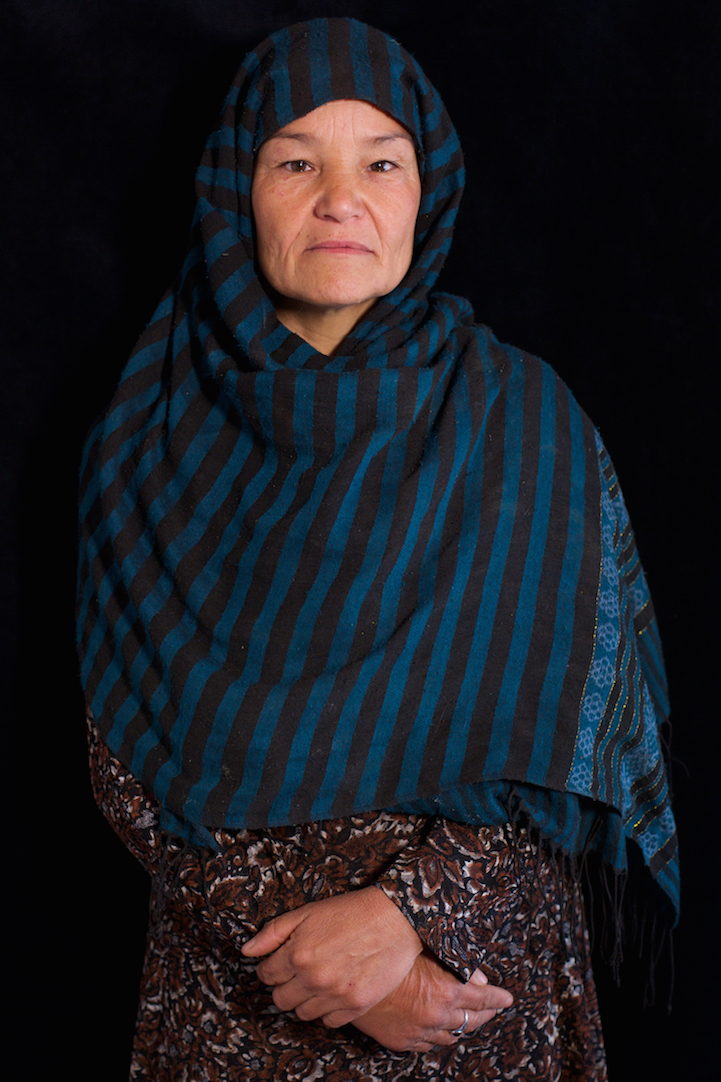 Hafissa, 40, Samagan
Hafissa, 40, Samagan
I went to school until I was about 13 or 14, and then there was war everywhere in the country. Now I work as a cleaner and earn, on average, around 50 Afs ($1) a day. I have seven children, but my son has mental problems. He is often angry and violent, and my husband has to look after him, so I am the one who goes to work. My husband used to work for the government, so when the Taliban came to power, his life was in grave danger. When the new government came in 2001, I thought peace would follow and we would all be free. And things are better; I mean, my children can go to school, but education is expensive, and my son takes a lot of looking after. I think things are better for middle-class women. I've always lived like this. When there is no security, there are no jobs and inevitably it is always the poor who suffer.
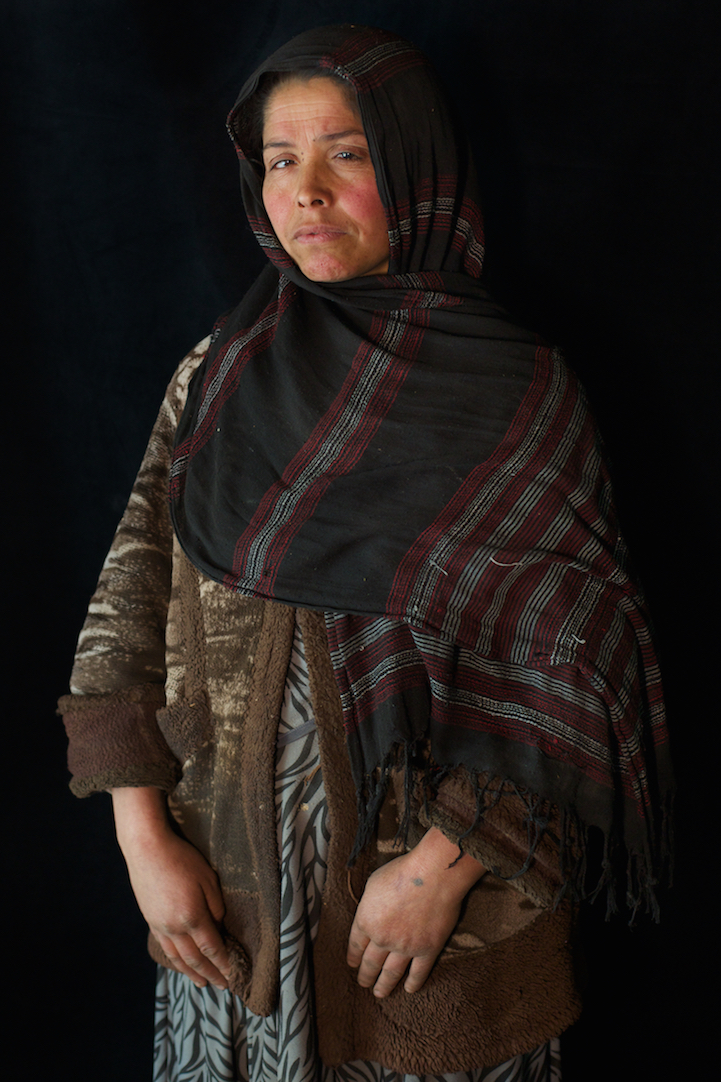 Sajida, 22
Sajida, 22
I never went to school, as there was too much fighting in the area, and then the Taliban were here. I am not married, as I have to be the main breadwinner of the family; my father is disabled and my older brother died. We live off tea and bread, as my wages also pay for my sisters to go to school. I'm proud that one day they might be able to become educated and earn their own money.
Since the fall of the Taliban, I don't think life has changed much, to be honest. The international people have brought a lot of money to Afghanistan, but it never reaches poor people like us; maybe they don't care. But I have to remain hopeful, as one day maybe my sisters will be teachers and earn money and will have a better life.
 Sajida, 35, Samagan
Sajida, 35, Samagan
I was married to an old man when I was 10. My parents had been killed in the civil war, and my sister looked after us, but when she got married, I belonged to my brother. He was fighting with the Mujahedeen, but had huge gambling debts and so sold me to my husband, who was also a fighter and about 50 when we got married. I was very young, but I was helpless and could hardly say anything to my brother–he owned me. Until I was around 14, my husband treated me like a daughter, but then I became a woman and pregnant. But the Taliban were in power then, and I lost the baby and the one afterwards, as I couldn't get to a hospital. I have just two children now, which is enough.
When the Taliban fell, I was hopeful that life would improve, but it hasn't. Sometimes I work as a cleaner and earn about 100 Afs a day, but it's not enough. Search my home, and I swear you will not find a thing to eat. Two days ago, my uncle gave me two naans (flat bread loaves) but I don't know what to do about today. I owe about $300 to neighbours who have leant me money to pay for the rent of this house, which is $30 a month. My husband needs medical care, and I have had a headache for days, but there's no money for medicine.
I have never seen happiness, but I want my children to grow up and become successful people so that they can look after me and I can relax and we can live in our own home.
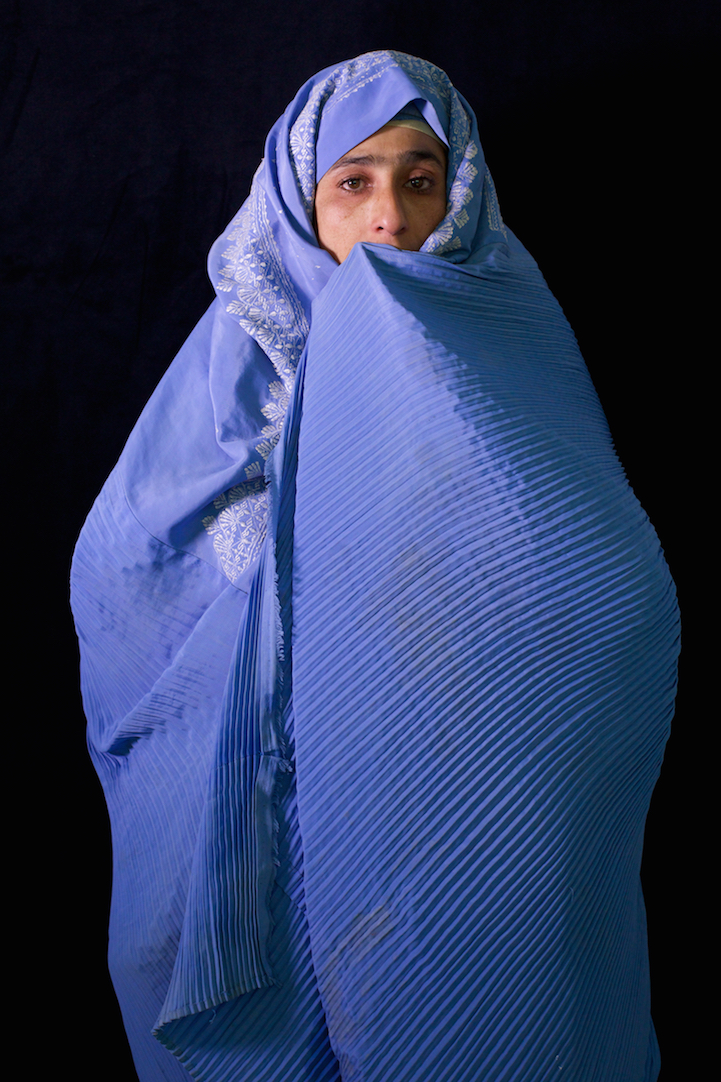 Rana, 30, Balkh
Rana, 30, Balkh
Sometimes I work as a cleaner, and sometimes my husband gets days' labouring work, but he is ill, so we struggle to make ends meet. We live on 200 Afs ($4) a day, which we spend on food, water, and school for the children. The people I clean for sometimes give me food, too. I got married when the Taliban first came here. I was still a girl, then, and it was two years before I could have any children; my husband was maybe 20 years older than me.
Life is generally better now than before for women, as we are allowed to go out, and I can work, but if my children are sick, I can't afford a doctor. Two years ago, I was getting aid, as we hadn't enough food, but there is no aid now, and living is tough. The government needs to oversee aid distribution, as it usually gets given to community elders, but they just give the money to their relatives and not to those who really need it. The main problems facing women are insecurity and illiteracy. And even when women are educated, many of them can't find jobs or aren't allowed to work.
From the day I knew the difference between my right and left hands, I have never seen happiness apart from my children. But how can I smile when we rely on alms?
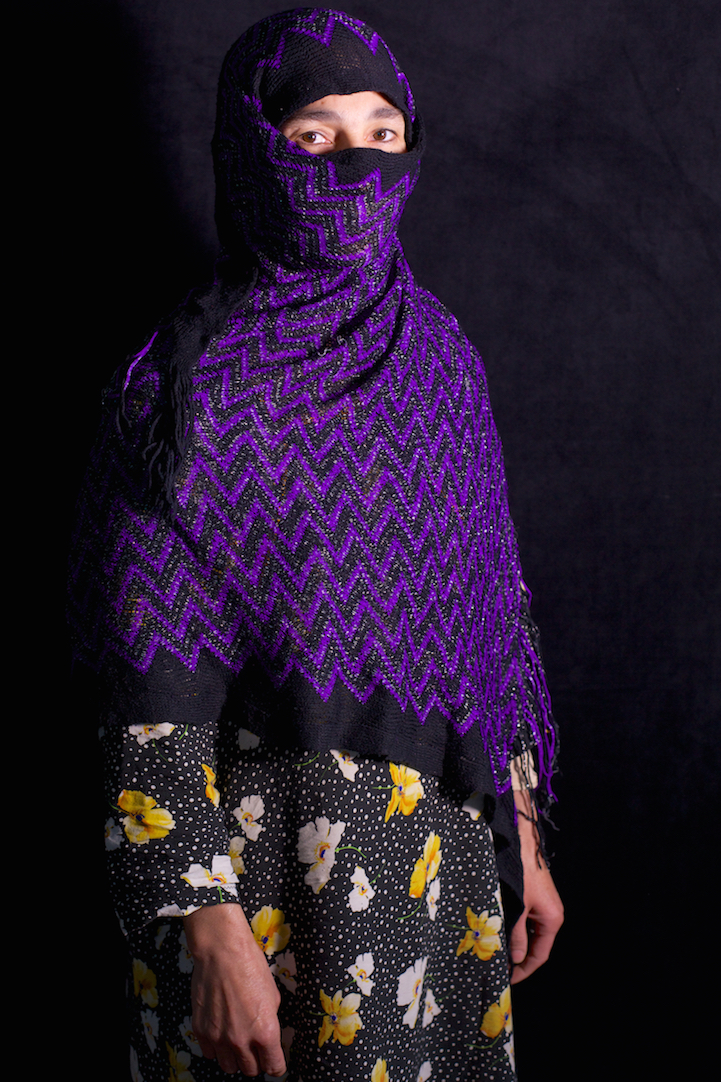 Noorjahan, 40. Mazar-e-Sharif
Noorjahan, 40. Mazar-e-Sharif
I was born in a village in Jowzjan province, but we moved to Pakistan when the civil war began, as Turkmen communities like ours were hated by the mujahedeen (“those engaged in jihad”). We came back to Afghanistan five years ago. Life is better for us here than in Pakistan, and for the last five months, things have really been improving, as my husband has his own jewellery shop and our financial situation is better. Before then, life was rather difficult. When he had no work, he would get angry and hit me. But most women in Afghanistan are beaten by their husband or his family. My mother-in-law, for example, she treats me like a daughter-in-law and not a daughter, and sometimes hits me, too. When that happens, I feel really lonely.
I used to be a carpet weaver, which is very difficult work, as you sit in the same position all the time, and the dust from the wool makes it hard to breathe. Often, we took opium to make the pain go away. When I was pregnant, I was really ill, and the doctor told me to stop. I still make clothes for my children, though.
My hopes? I just hope that we can continue living with the financial stability we now have. I am worried about when the foreign people leave Afghanistan; maybe there will be more war, and my five children won't be able to go to school.
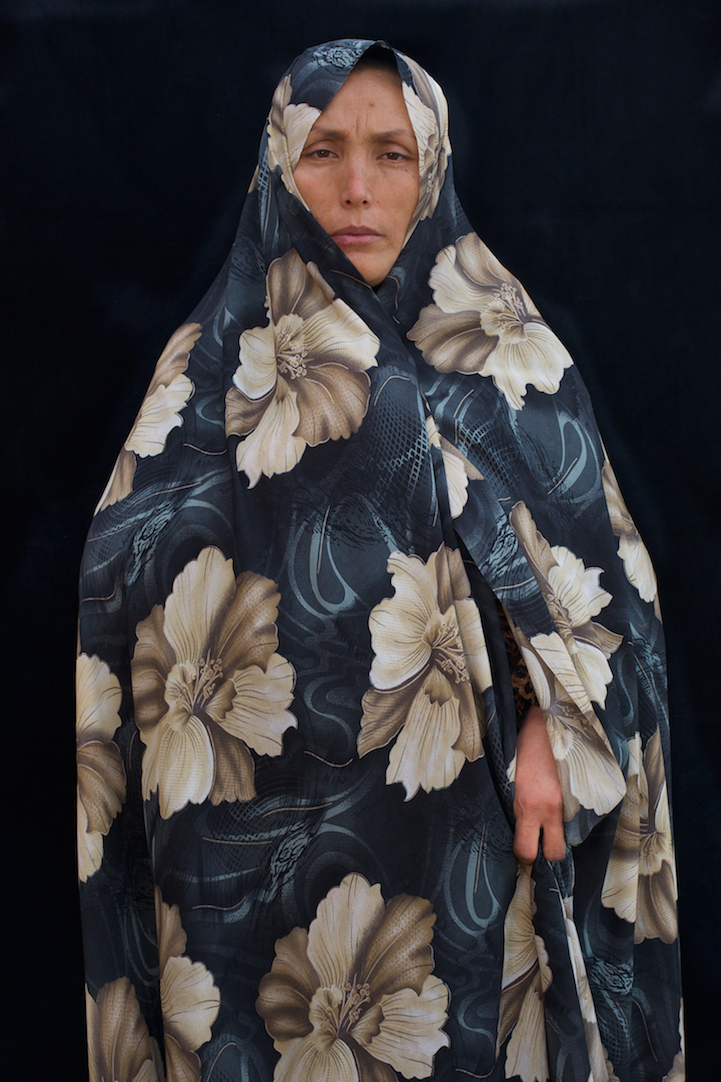 Rokhia, 35, Mazar-e-Sharif
Rokhia, 35, Mazar-e-Sharif
I'm head of the women's shura (council) at the IDP camp here in Mazar. 25 years ago, I left Bamiyan province for Iran because of the civil war. Hazara people like me suffered if they stayed in Afghanistan. We came back 10 years ago, but life was better in Iran. Now, I live in a large IDP camp, but our situation hasn't improved. I was chosen by the council to be head of the shura and to be the voice of women in my community, as I am the most honest, but our situation never improves, and we face many problems. For example, the camp where we live is quite well-established, but still we have no roads, so it takes a long time to get to the clinic or to schools. We mainly eat tea and bread every day, and no one has any kind of employment. But we need to work to survive. We need to be literate–men and women. Violence in the community is increasing. My in-laws beat me, but I don't know why.
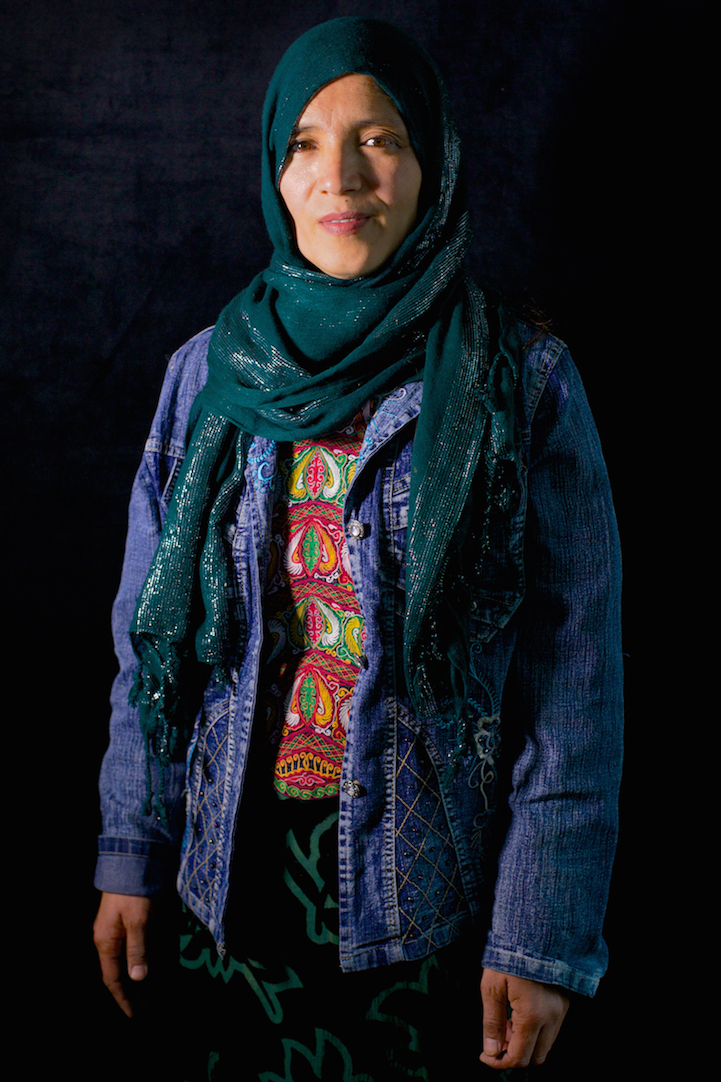 Ijamal, 38, Mazar-e-Sharif
Ijamal, 38, Mazar-e-Sharif
In Turkmen families, when you get married, the husband's family pays a lot of money for you, so they treat their new daughters like slaves. My mother warned me about this at around 14 or 15, when I got married. I used to get up at 3am to make sure my mother-in-law had enough water for her morning prayers and ablutions. But my mother-in-law used to tell my husband bad things about me, so he used to beat me. I worked so hard, so I don't know why. She used to say to me, “We gave money to your father so now we own you and we can do what we like to you.”
As a new daughter, you are also expected to weave carpets, and because you have to do all the housework for the whole house, a lot of Turkmen women end up being addicted to Tariak (opium). It's meant to keep you awake, and it make things easier, but I tried it once and it made me go to sleep. Lots of women give it to their children to make them quiet or to make them help with the housework. It's really dangerous, and I've seen lives destroyed by it.
Unemployment and illiteracy are the reasons why Turkmen women treat their daughters-in-law so badly. It's all they have ever known from their own mothers-in-law, so it's like a cycle. I don't have a daughter, and I always wanted one, so I know that when my sons get married, I will be kind and treat their wives as if they were my own daughters.
There have been many changes in my life, though, as I now work with an organization that taught me about rights. I used to be really shy; 13 years ago, if I had a problem, I would just cry on my own in a corner. Now, because I am aware of my rights, I can help other women improve their lives, too. One girl I helped was married at 14, and when her husband left for Pakistan, his mother kicked her out of the house. I helped get her a divorce with the Human Rights Commission, and now she is married to a good man with a kind mother.
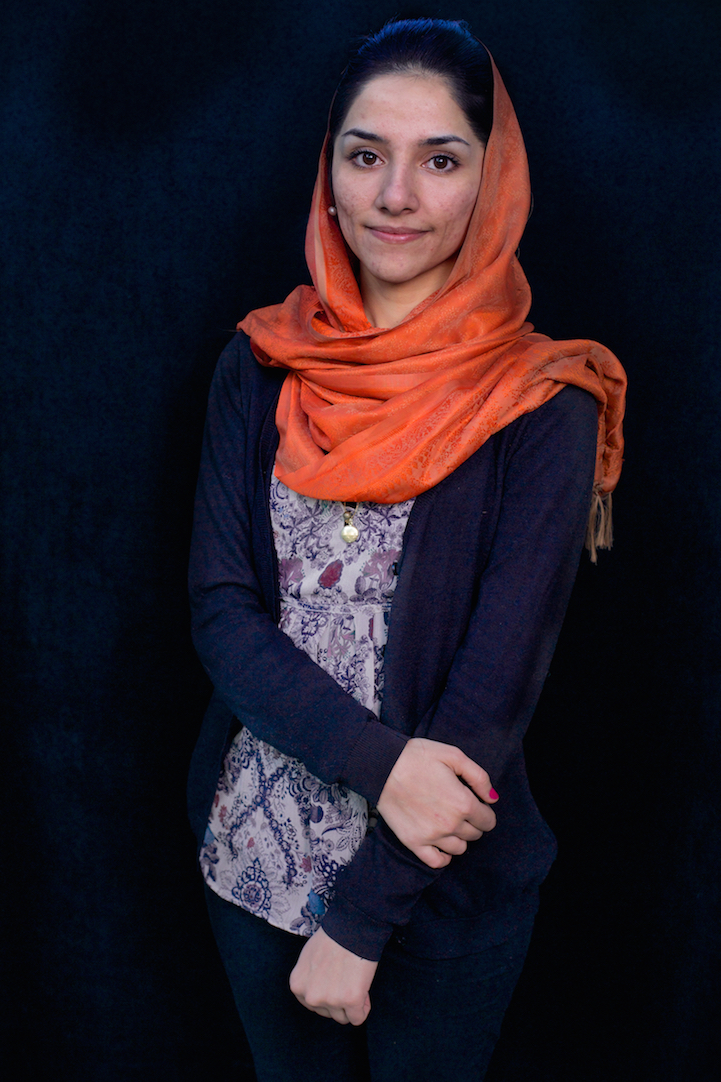 Storai Stanakzai, 22. Kabul
Storai Stanakzai, 22. Kabul
I'm a contemporary artist working with jewelry design. I was always encouraged by my family to paint and be creative, and this is one of the reasons I try so hard to succeed. But it's not easy working in the arts as a woman. I have a page of my designs on Facebook, but people have started to post pictures of sex there and message me saying that my work is un-Islamic. There's a guy I used to study with who is really pious and keeps doing this. He even told one my friends he would throw acid in my face. I walk around the city on my own all the time without a guardian, and people say stupid things or call me names, but I really don't care. People like that are backward, but if you tell them what you think about them, they would definitely try and kill you, so I say nothing. It's not really their fault; they have lived in war all their lives–their minds are warped; I'm sure they are mentally sick. I am scared of my society, but art is peace for me, and I don't care if people like it or not. My father tells me to ignore what people say.
I lived in Kabul for a year and half during the Taliban regime, so I know very well the problems we face. But I know that I can and will succeed. In order for women to succeed, we need to take small steps. I don't think wearing a burkha, for instance, is oppressive. But being told to lower your voice and to stop having opinions–now that's oppressive. So you have to think about ways of progressing that backward people will accept. Here, it is expected that girls marry at 18 and then their lives are over; they are just in charge of having children and the home. But I think you have to live your dreams and force people to let you dream. You can't let people kill your dreams.
Some of my friends tell me their dreams: to get married to a Prince Charming and have a family. But how can you expect to marry a prince like that if you don't work on yourself?
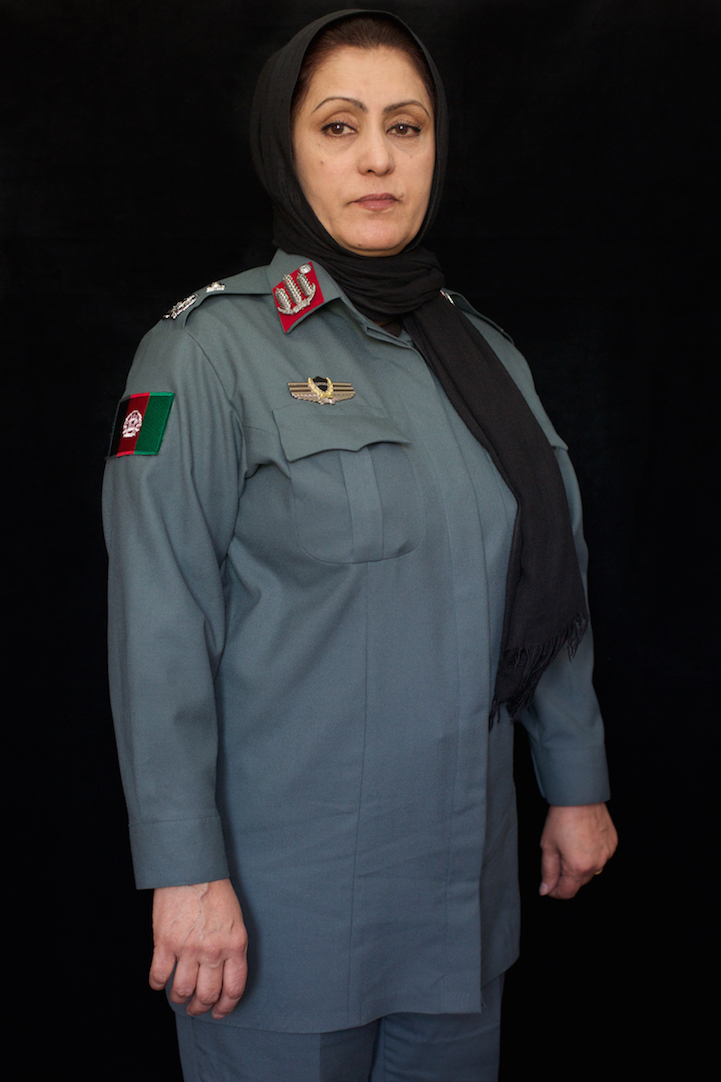 Colonel Jamila Bayaz, Kabul's first female police chief
Colonel Jamila Bayaz, Kabul's first female police chief
I always wanted to be a police officer and follow in my father's footsteps. After I graduated, I worked in the criminal investigations department, but then there was a civil war, followed by the Taliban. We girls had to stay inside during those days or else be beaten. They stole our lives.
When they were ousted, the country was on its knees, but as soon as I was able to, I returned to work in the police force. It's a tough job, especially since most people think women shouldn't work–least of all, doing a man's job. Women like me face daily threats–even from our colleagues in the police force, who try to make things really difficult for us. Until recently, policewomen didn't even have their own bathrooms or changing rooms in police stations. I'm constantly getting death threats, and my own daughters can't tell their friends what I do for a living; people just don't approve and think policewomen are prostitutes. But it is our duty as daughters of this country to fight against such ignorance.
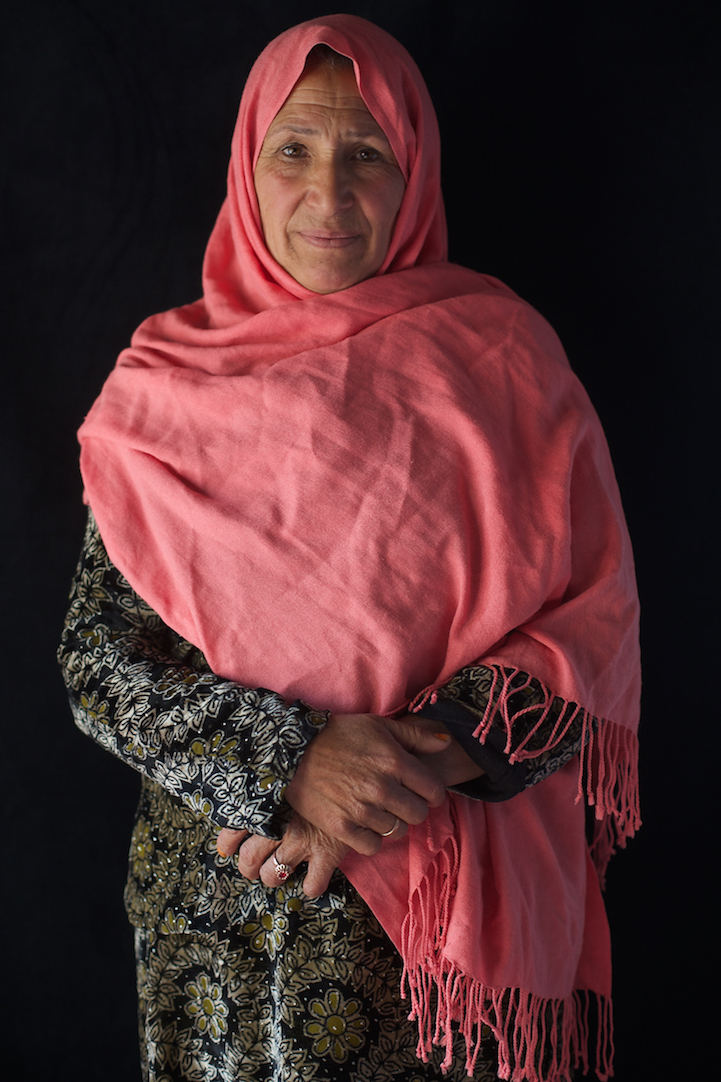 Parween Akuzada, 47, Paghman
Parween Akuzada, 47, Paghman
I have nightmares all the time about our house being destroyed or my family dying. Sometimes I scream at people for no reason. I get angry quite quickly, but I don't know why. When I have enough money, I can get medicine, which helps, but this isn't often.
I was born in Kabul, but we moved here to Paghman during the Civil War. I thought it would be a safer place, but one day I called my children in from playing to have lunch. Then I heard the sound of a rocket, and then it hit. There was so much dust and debris, I couldn't see, but all I could hear my son calling for me through the darkness. He had been injured and was covered in blood. My nephew was lying next to him, and his head had been smashed and his whole body was mangled on the floor. I tried to shield it from him, but instead he saw his cousin's shoes filled with blood.
The Taliban days were worse than that, though. We lived in fear. My children used to ask me why it was happening, and I just told them it had always been like that. In a way, it always had. I was pregnant at the time and needed a blood transfusion, but there was nothing in the clinics, and I lost the baby.
When they left, there were good changes–we were allowed to go outside when we wanted, and my daughter can now work, but we are still poor. I'm afraid those days will come again, and when I think about it, my hair stands on end. Sometimes I tell my husband about my fears, but he gets angry with me for bothering him with my problems.
My son is still disabled from the rocket, but is the only one who can work, and he brings in about 200-300 Afs ($4-6) a day working as a bus ticket collector. We have a cow, but it stopped producing milk a few months ago.
I never went to school, but I wish I was literate. I think that is the biggest problem we face: illiteracy. And poverty. And inadequate healthcare. And poor security. But if we are hand in hand, our children will have a better life than we had.
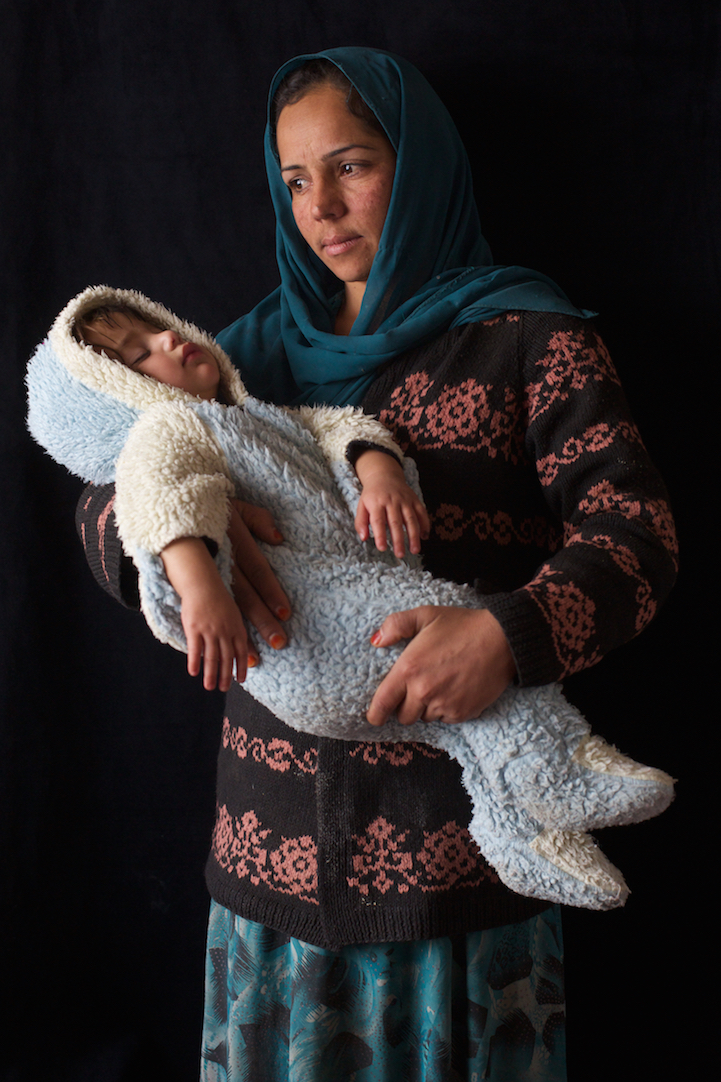 Anissa, 28, Paghman
Anissa, 28, Paghman
I was born here, but went to Pakistan when I got married. My husband's family was living there as refugees, and I guess my family wanted me to have a better life, as there was war here. When we got married, it was the first time I had met him, and it was also the day the Taliban arrived here, so there were no wedding guests. He was much older than me, but I can't remember how old I was. It was difficult joining a new family, and I missed my own; I had never spent a night away from them before, and for 10 years, I was worried sick not knowing if they were alive or dead.
I suffered a great deal, but I survived. I suffer a lot now, too. In this house are my husband and his two brothers. They each have a wife and we all have a lot of children–too many. I have nine children and 11 of us live in one room. My husband is a good man, but he is sick and can't work all the time. His brother beats me if I'm too noisy. Life in Pakistan was definitely better, as our family was smaller and more manageable. I don't want any more children, so I try not to be romantic with my husband, but he gets angry.
Hope? Why not? From the morning to the evening, I hope for life to improve, but my husband isn't capable of making it better. Maybe my children will have a better life and look after me. There's no one else.
My Modern Met: What's the inspiration behind Unveiled?
Lalage Snow: I had just moved back to London after four years in Kabul. Women's rights in Afghanistan was being discussed a lot at the time in the press because there was a presidential power vacuum at the time. But a lot of what people were saying was either misinformed or just plain wrong. Afghan women from all over the country are always regarded as one collective group regardless of where they live, where they are from, economic status, ethnicity, age, creed, etc., and in a sense, they are faceless. An illiterate woman from the provinces with numerous children and a husband who doesn't know who the president is, let alone what a “right” is, has different thoughts and aspirations than a young Kabuli urbanite who has been raised in Iran, likes pop music, and dreams of running a business. And when politicians and gender specialists here or in Western Europe talked about women's rights, it felt like they were superimposing their own ideas onto Afghanistan without understanding the culture. The issue of the burkha, for example. It is seen in the West as a symbol of suppression by women's family or by society, but many women choose to wear it because it gives them anonymity when out of the home. My idea was to let the women I interviewed speak for themselves, to explain what their own personal concerns or aspirations were. I wanted to photograph them against a plain background and to light them as “individuals” rather than as a collective “other” of “poor women in Afghanistan” in order to encourage the viewer to engage with the subject through the photograph, and by reading what they have to say.
MMM: How did you find subjects to photograph and interview?
LS: I worked with an NGO, Oxfam, with whom I had a good relationship, and who allowed me a lot of freedom. They had a lot of partner organizations in the remote provinces that helped identify women who would be allowed to speak to us. There was one woman I had photographed in 2012 with them in a hospital, and her story really stuck with me. She had walked barefoot for a few days to the hospital with her three children and sick baby. She hadn't eaten properly in days, wasn't producing milk, and had no idea where her husband was. She thought I was a doctor and broke down in tears begging for help. Her problems were nothing to do with rights, but came down to dire poverty. She even said, “Think of the poorest people in the world and then take away everything they have. That's me.”
I wanted to find her again, and amazingly, I did find her. She was still very poor, but her husband had returned, and her children were healthier. She was working as a washerwoman in the local community and earning $2 a day. She still didn't have shoes, though.
MMM: What struck you most about these women?
LS: Their resilience, their stoicism, their bravery, their strength, and their humor. Cheesy as hell, but it's true. I also realised that almost everyone in the country, men and women alike, suffers from PTSD.
MMM: Would you say that the stories and experiences of these subjects are representative of most women in Afghanistan?
LS: Yes. Well, that was the idea–to highlight the many different and nuanced issues when it comes to gender in Afghanistan. Throw a dart and nine times out of 10, you will find a woman or girl who is in an arranged marriage, has been forbidden from working alongside men, has issues with her mother-in-law, is treated like dirt. But occasionally, you will happen upon a girl or woman who flies in the face of the norm and who runs her own business, refuses to marry, is the breadwinner for the family, etc. The caveat here is, of course, usually these are girls from progressive families with open-minded fathers and brothers who permit her to live thus.
It would be impossible to beat around the bush, however. It sucks to be a woman in Afghanistan. Bibishah had a particularly devastating situation. A literate and educated widower with seven children, four of whom were severely brain-damaged. Her husband had been a driver with the UN, and so he had earned a decent wage to support his family. Once that income was taken away, Bibishah was still the “property” of his family, who were not quite as literate or as open-minded as she and her husband were. Indeed, many of the relatives she lived with were also brain-damaged in some way (probably as a result of inbreeding), and her daily life was a living hell surrounded by severely disabled relatives who often smashed windows or threw things at her. She had no income and no way to escape the hell. I left the interview fighting back tears.
MMM: As you say, there have been “tangible gains” for Afghan women since the fall of the Taliban regime, but there's still a long way to go. Given your time in Kabul and the your experience connecting with different women, what do you think are some of the biggest hurdles that still need to be overcome in the fight for women's rights and a better quality of life in Afghanistan?
LS: A woman is considered to be property here. You belong to your father until you marry, whereupon you belong to your husband and his family. That is “Afghan Gender 101.” So a woman's fate here is dependent on who “controls” her. Some are lucky, others are not. The biggest hurdles above and beyond societal issues are basic, however: crippling poverty, literacy, education, access to healthcare, and systematic corruption. But it's not just as simple as wading in to “empower” women, which is what many organizations do here. Modesty and conservatism are revered in Afghanistan, so when western organisations give women the means of independence, they often do more damage; if a woman is seen as “favored” by outsiders, she runs the risk of being labeled a “bad” woman, and her reputation will be questioned. Reputation is key. One woman I photographed, I ended up discarding the material because it was such a pathetic situation. She was the oldest woman in the family; she couldn't walk or speak properly. I wanted to speak to the younger girls of the family, but the men wouldn't let them–it would damage their reputation in the community to be seen to be “on camera” and fraternizing with foreigners (it was a particularly conservative refugee family from the South). They deemed the great-grandmother to be suitably half-dead enough to be fit for the camera and to be interviewed. It felt like photographing an animal, so I stopped and walked away.
MMM: What message do you hope to send through this series?
LS: It's a tough one. That women's rights are complex here, and that gains will take generations to manifest, which is a little depressing. I think I basically wanted to open the conversation, to encourage viewers to engage and identify with the women intimately. It's not so different from what I did with We Are The Not Dead. I believe in letting the subjects speak to the viewer.
Lalage Snow: Website | Twitter
My Modern Met granted permission to use photos by Lalage Snow.
